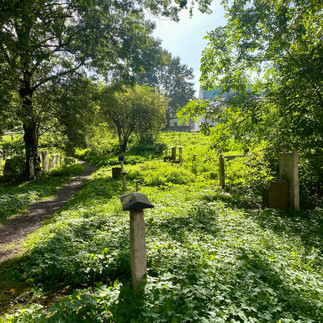Week 63 of our 78-week humanitarian mission to Slovakia and Poland is in the books.
- slovakia7
- Oct 21, 2023
- 5 min read
Sunday is the 14th month anniversary of leaving on our mission - August 22, 2022. We must be getting close to returning to Colorado as we received an email this week asking about booking flights to return home. We will be so sad to leave our humanitarian partners and the many friends we have made, but cannot wait to see our children, son and daughter-in-law, and our six beautiful grandchildren.
“True charity is the desire to be useful to others with no thought of recompense." - Emanuel Swedenborg (1688 - 1772).
Emanuel Swedenborg was a Swedish pluralistic-Christian theologian, scientist, philosopher, and mystic. He became best known for his book on the afterlife, heaven, and hell. He had a prolific career as an inventor and scientist.

Poland fact of the week . . . Their constitution was the 2nd in the world. The first fundamental law in Europe was the Polish Constitution adopted on May 3rd 1791, four years after American Constitution.

We received good news as we had three additional projects approved this week.
Project #1: Domovino is an organization and facility which takes care of men classified as having severe mental illness. They are currently at full capacity of 112 men with 12 men being suffering from schizophrenia. These men will never be able to care for themselves and will remain at the facility indefinitely.
Being able to closely monitor the facility and its residents is critical for Domovino especially since all of the residents suffer from mental illness. There are eight buildings on the 2.50 acre property. Domovino has a security system that is 13 years old and is not working properly. We will provide the funds to replace the system so they can better monitor the activities of the residents to insure their wellbeing and safety.
It takes an outstanding director, Ladislav Vastuško, and his dedicated staff of 70 to care for these special men. Kelly and I have learned so much during our mission from people with mental illness. We have found them to be kind, gentle, and so loving and accepting of everyone. I will leave Slovakia a better person for having the blessing of spending time with these special people.
Project #2: Mental health has become one of the most critical needs of the Ukraine refugees in Poland. This is a follow-up project from our initial funding of 1.500 psychotherapist sessions earlier this year. Our Partner, Let's Help Together, is the leading refugee mental health center in Poland. They have six Ukrainian therapists who are refugees themselves.
This will be a longer project description than I normally provide, but I feel so strongly in supporting mental health initiatives that I want to provide the current status of this issue for Ukrainian refugees.
1) The National Library of Medicine published a report on Ukrainian mental health in Poland which concluded, "The results of the screening tests indicate that depression, anxiety disorders, and PTSD may be observed among 73% of respondents, whereas 66% of the respondents display psychological distress. The analyses have shown that higher levels of mental health disorders were observed among women and refugees who do not speak Polish. Younger respondents experienced a higher psychological distress."
2) The United Nations in cooperation with UNICEF has reported that, "More than 60% of Ukrainian mothers in Poland are experiencing high or sever levels of distress. Mental health and psychological support is vital to help families and children heal from the invisible wounds of war."
3) Sofia Sprechmann, CARE International’s Secretary General said, “As mental health needs increase, psychosocial and mental health support must be made available and accessible to affected Ukrainian women, men and children, and treated with the same urgency as meeting physical needs. Lives and futures depend on it.”
4) The World Health Organization has stated that ensuring appropriate mental health services are immediately available will help to address a wide range of people’s emerging mental health and psychosocial needs, as well as support the healing and rebuilding of affected communities.
5) A study by the John Hopkins Bloomberg School of Public Health reported, "Thousands of Ukrainians have newly onset mental health conditions such as post-traumatic stress disorder, depression, and anxiety. These refugees are now seeking mental health support in countries across the European Union. Many European Union countries, however, were unprepared for the sudden increase in mental health demands resulting in a shortage of mental health professionals available to accommodate growing needs. Creating a mental health care system catered to addressing the specific needs of refugees, through outreach services in communities, partnering with trusted local organizations, collaborating with international agencies, and utilizing nontraditional interventions such as digital and online treatment programs, can help to effectively provide essential care to vulnerable refugee populations."
6) Post-Traumatic Stress Disorder can occur in children after even a single traumatic event, but repeated or prolonged trauma increases the risk. The symptoms will vary but the affected children may show intense fear, helplessness, anger, sadness, horror, or denial. They can also develop physical symptoms including headaches and stomach aches; show more sudden and extreme emotional reactions; or have problems falling or staying asleep. Children who experience repeated trauma may develop dissociation, a kind of emotional numbing to deaden or block the pain and trauma.
Let's Help Together is doing important work to heal the terrible traumas of war.
Project #3: Centrum sociálnych služieb Dubrava was established in 1961 as a social service facility. Dubrava currently provides permanent, long-term, and 24x7 care to 75 senior adults with physical disabilities and significant mental disabilities.
Dubrava has been designated as part of the “Deinstitutionalization" movement in Slovakia. This movement is to move mentally and physically disabled people from historically inadequate hospital-based institutions to community-based facilities. Dubrava has been recognized for their success in creating an ideal deinstitutionalized facility.
We have supported Dubrava in the past and they have proven to be an excellent partner. Their singular focus is to create an environment for their residents that promotes mental and physical health, as well as a sense of community. With this project we will provide funds to build a Pétanque court. Pétanque is best described as 'stationary' bocce ball. Pétanque can be played by senior adults regardless of their mobility limitations, including from a wheelchair. The Pétanque court will provide for occupational therapy with the court also being used for community gatherings, where members of the community will join the residents in friendly competition.































Comments